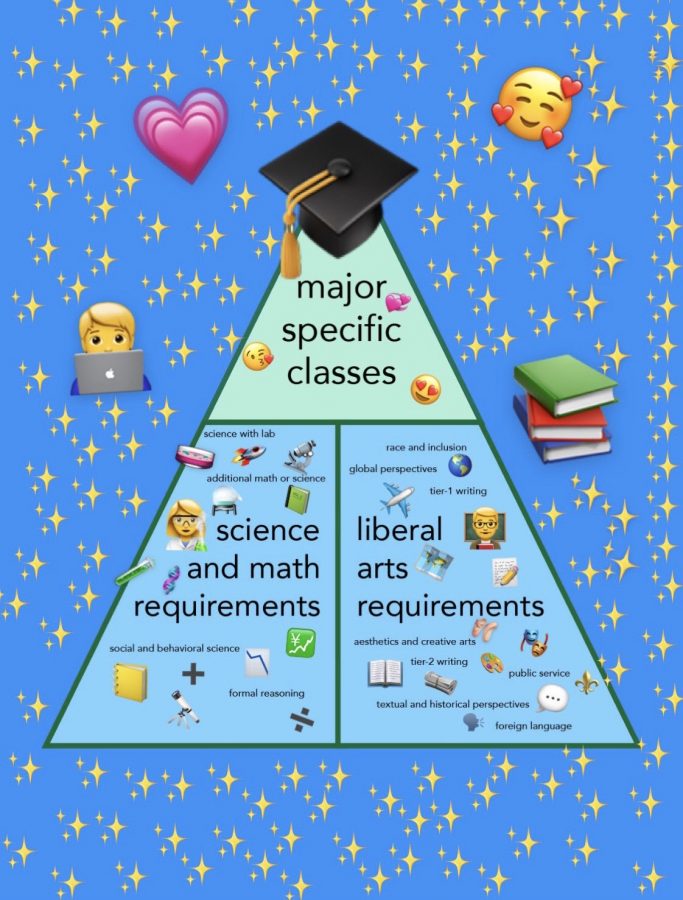General education is vital, despite bad reputation
Ava Lemos | Views Layout Editor
Despite arguments about core curriculum being an unnecessary hurdle, these classes are an essential part of a holistic education.
March 4, 2020
The following is an opinion article and does not reflect the views of The Tulane Hullabaloo.
Like many colleges, Tulane has general education requirements, referred to as its core curriculum. Its purpose, according to the university, is to provide a “well-rounded base of knowledge and to spark academic curiosity” as a “response to an increasingly globalized world.” Many consider gen-eds a source of inconvenience and a roadblock to their straightest shot toward finishing their major. This attitude, however, fails to consider the true value of general education requirements and their role in a well-rounded education.
When students complain about general education, they often say that it “distracts” from their intended major, and they feel as though they are wasting time. Some assert that they could finish their education more quickly, or gain greater knowledge in their field if they weren’t forced to take a broad array of classes.
This claim rests on the assumption that our lives and professions exist in a vacuum, but the truth is that every field is interdisciplinary. Everything we do is touched by the context in which we do it. It is vital, of course, that a doctor be well-versed in biology and medicine. But it is also endlessly valuable that a doctor has a comprehensive understanding of ethics or sociology. In a society where Black women die at two to six times the rate that white women do during childbirth, it is obvious that racist systems affect how medicine is practiced. Doctors need to be educated in order to subvert this.
That’s just one example, though. English teachers need to have basic understanding of science so they don’t espouse climate denial to the young minds they are shaping, and government employees need to know the history of the people and places they are serving.
General education requirements help students get a better, more holistic education that will eventually better serve them in their professions. If students were able to exclusively take classes in their major, they would be able to isolate themselves completely from the broad scope of education available to them, and they would be worse off for it.
Much of the aversion to general education requirements, however, speak to a larger issue with how education, especially college education, is framed in America. For those without unlimited wealth, there is a clear incentive to get your degree as quickly as possible, both so you can pay less overall and start making more money sooner. In a climate in which wages are depressingly stagnant for those without college education, and college tuition, as well as debt, is exponentially higher than ever before, it is no wonder that anything which makes college less “efficient” would be met with some pushback.
Instead, we should be fighting back against the way that economic inequality limits our ability to explore education to our fullest potential. When we think of learning as important only insofar as it increases economic output, people lose out on a wealth of education that enriches their interactions with their society, their communities and themselves. When we are forced to define our lives solely by what we produce, we lose out on both individual fulfillment and the betterment of society.
The persistence of general education seems at odds with our current attitudes towards education — as a means to an end as opposed to a value on its own. This is true, but it is our current attitudes and systems that are broken, not the idea of broad and challenging education.
This is not to say that the general education requirements at Tulane are perfect or couldn’t be significantly improved. But the concept of the core curriculum remains valuable. Tulane recently added a “Race and Inclusion” general education requirement, which will hopefully encourage students to venture outside their comfort zone and gain knowledge that will hopefully help them engage with the world in a more thoughtful way.
If the system is not allowing general education to flourish, that is because the system is flawed. If we get rid of general education, we risk producing students who do not look outside themselves and their interests, in the same breath failing them and the society into which we release them.






















Leave a Comment